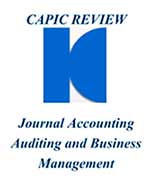Published 2015-12-10
Keywords
- Professional Accounting,
- Social Balance,
- Reasonable assurance engagement,
- Limited assurance engagement
How to Cite
Abstract
According to the Accredited Accounting Research Projects framework, it has been observed that the fundamentals and dynamics of the audit or review of the process and the resulting economic and financial accounting information can be used to evaluate or verify the process and socio-environmental accounting information.
In Argentina, the Argentina Federation of Professional Councils in Economic Sciences (FA CPCE) techniques (or technology) has proposed rules on Social Report and Auditing, other assurances, certification and related services, by means of Technical Resolutions (RT) No. 36 and No. 37, respectively.
The objective of this research is to contribute to the credibility of the socio-environmental accounting information. To meet this objective, a selection and a hermeneutical analysis of relevant aspects of the rules regarding Social Report and Assurance Engagements issued in Argentina is carried out, results obtained and conclusions are inferred.
Among the results, we can highlight the recognition of the need to issue Social Report for sustainability and to incorporate professional services such as accounting assurance engagements, which may be reasonable or limited.
Among the conclusions it is stated that the organization may decide to issue the Social Report jointly or separately with the Financial States and that the period for which it is issued must be the same at which such financial statements relate. If so, when circumstances warrant, it may be desirable to place an order reasonable assurance Social Balance. To present a financial statement for interim periods and the Social Report for the same period, it could be conducive to place an order limited assurance.
The review of the Social Balance by the accounting professional, adds credibility to information, contributing to the “common good standing” of society.
Downloads
References
2. Casal, Armando (1999). La auditoría integral. Auditoría. Temas Seleccionados, Ediciones Macchi. Buenos Aires.
3. Casal, Armando (2010). La auditoría conforme a las prácticas internacionales de los estudios líderes del mercado. Profesional & Empresaria (D&G), Errepar. Buenos Aires.
4. Consejo Profesional de Ciencias Económicas de la Provincia de Buenos Aires (CPBA) (2001). PROLOGO, Código de Ética Unificado, F.A.C.P.C.E. Obtenido el 12 de agosto de 2015 de: http://www.cpba.com.ar/Consejo/Tribunal_Etica/Codigo_Etica_Unificado.pdf
5. Federación Argentina de Consejos Profesionales de Ciencias Económicas (FA CPCE), Centro de Estudios Científicos y Técnicos (CECYT) (2011). Proyecto N° 23 de Resolución Técnica, BALANCE SOCIAL, obtenido el 17 de agosto de 2015 de:
6. Federación Argentina de Consejos Profesionales de Ciencias Económicas (FA CPCE) (2012). RESOLUCIÓN TÉCNICA N° 36 NORMAS CONTABLE S PROFESIONALES: BALANCE SOCIAL, obtenido el 17 de Agosto de 2015 de:
http://www.consejosalta.org.ar/wp-content/uploads/balance_social/proy_23_resolucion_tecnica_balance_social.pdf
http://www.facpce.org.ar/web2011/Noticias/noticias_pdf/rt36.pdf
7. Federación Argentina de Consejos Profesionales de Ciencias Económicas (FA CPCE) (2013) Resolución Técnica N° 37 NORMAS DE AUDITORÍA, REVISIÓN, OTROS ENCARGOS DE ASEGURAMIENTO, CERTIFICACIÓN Y SERVICIOS RELACIONADOS, obtenido el 17 de agosto de 2015 de: www.facpce.org.ar/
8. Fowler Newton, E. (2009). Tratado de Auditoría. Editorial La Ley. Buenos Aires, Argentina.
9. Geba N. y Sebastián M. (2003). La Auditoría de la Información Contable: Una óptica científica en la Teoría General Contable, 9no. Encuentro Nacional de Investigadores Universitarios del Área Contable. Instituto de Estudios Contables, Facultad de Ciencias Económicas, Universidad Nacional de La Plata.
10. Geba N. y Sebastián M. (2004). Un Aporte de la Auditoría Contable a la Credibilidad de la Información Contable Social, XXV Jornadas Universitarias de Contabilidad. Ias. Jornadas Universitarias Internacionales de Contabilidad, Facultad de Ciencias Económicas, Universidad de Buenos Aires.
11. Geba N. y Sebastián M. (2005). Auditoria de los Balances Sociales con un Paradigma de Desarrollo Sustentable, XIV Jornadas Profesionales de Contabilidad, XVII de Auditoría y VI de Gestión y Costos. Colegio de Graduados en Ciencias Económicas de la Ciudad Autónoma de Buenos Aires.
12. Geba, N. y Sebastián, M. (2008). Viabilidad de los procedimientos de auditoría tradicional para auditar información contable socio-ambiental, obtenido el 17 de Agosto de 2015 de: http://www.econ.uba.ar/www/institutos/secretaradeinv/forocontabilidadambiental/resumenes/geba_viabilidad.pdf
13. Geba N. y Sebastián M. (2010). El Balance Social y su auditoría, Profesional y empresaria D&G de ERREPAR Nº 124. Enero 2010 Tomo XI, pp. 9-13.
14. Geba N., Sebastián M. y Bifaretti M. (2014). Los Informes de Auditoría o Verificación Contable del Balance Social: una propuesta de contenido, XXXV Jornadas Universitarias de Contabilidad, XIII Jornadas Universitarias de Contabilidad de San Juan. Facultad de Ciencias Económicas y Empresariales, Universidad Católica de Cuyo.
15. Geba N. y Sebastián M. (2014). La Auditoría y los Encargos de Aseguramiento del Balance Social, 20º Encuentro Nacional de Investigadores Universitarios del Área Contable y 10º Simposio Regional De Investigación Contable. Instituto de Investigaciones y Estudios Contables, Facultad de Ciencias Económicas, Universidad Nacional de La Plata.
16. Global Reporting Initiative (GRI). (2013). G4 Guía para la Elaboración de Memorias de Sostenibilidad, Principios y Contenidos Básicos, obtenido el 17 de Agosto de 2015 de: https://www.globalreporting.org/resourcelibrary/Spanish-G4-Part-One.pdf
17. International Auditingand Assurance Standards Board (IAASB) (2014). Norma Internacional de Auditoria Propuesta (NIA) 720 (Revisada) Responsabilidad del Auditor con Respecto a Otra Información Propuesta de Enmiendas Consecuentes y Adecuadas a Otras NIAs, obtenido el 22 de agosto de 2014 de: https://www.ifac.org/sites/default/files/uploads/Trans/IAASBProposed-ISA-720-April-2014espan1-IMCPacknowledgement.pdf
18. Mantilla B. (2010). ASEGURAMIENTO : ¿QUÉ ES ESO?, obtenido el 26 de Noviembre de 2014. de: http://es.scribd.com/doc/200665635/aseguramiento-que-es-eso-pdf
19. Martínez Díaz M. y Armenteros Vera I. (2006). Orígenes y clasificación de la auditoría de la información, obtenido el 28 de Febrero de 2015 de:
20. http://bvs.sld.cu/revistas/aci/vol14_5_06/aci17506.htm#cargo
21. Slosse C., Gordicz J. y Gamondés S. (2011). Auditoría, Editorial La Ley, Buenos Aires, Argentina.
22. Zanet Fernando (n/d). Nuevas normas de auditoría: ¿Qué significa hacer un trabajo de aseguramiento?; ¿En qué consisten los servicios relacionados?, Obtenido el 24 de Noviembre de 2014 de: http://www.consejo.org.ar/legalizaciones/files/Normas_de_auditoria_Zanet.pdf


































